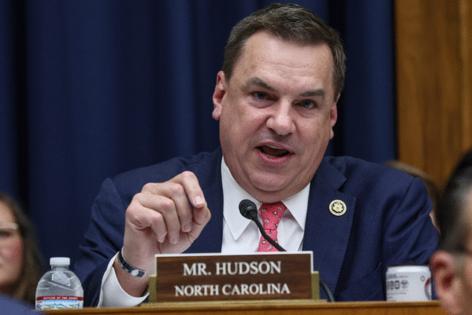Which NC members of Congress faced constituents at town halls this summer? Only a few
Published in Political News
Few “What I did this summer” reports from North Carolina’s members of Congress to their constituents back home will include “hosted town hall meetings.”
It is a time-honored tradition for members of Congress to go home for the month of August to meet with their constituents, hold town halls and campaign.
“The basic idea of August recess was to get out of D.C., one, because it’s hotter than Hades, and two, was to make the connections back home,” said Michael Bitzer, political science professor at Catawba College. “That legislators should hear from their constituents, make the rounds and visit companies and locations in their district and having an interaction and engagement with their folks back home.”
Asher Hildebrand, a political science professor at Duke University, served as retired Rep. David Price’s chief of staff, and before that was the Chapel Hill Democrat’s district director. As district director, Hildebrand was in charge of setting up Price’s schedule when he was back home.
Hildebrand said there wasn’t a hard-and-fast rule that members must hold town halls, but in modern political history, there was a fair expectation from voters that their representative would make the effort when they got time in the district to engage with constituents.
And he added that this meant time spent with people regardless of their geography, politics or socioeconomics. It was about meeting voters who didn’t have the means to come to Washington and lay out their case to their representative, Hildebrand said.
“That’s how we always approached it,” Hildebrand said. “We felt a sort of representational responsibility to engage with and provide an opportunity for input from a full range of views and interests that were represented in our district whether we agreed with them or not.”
Sixteen people represent North Carolina in Congress: two in the Senate and 14 in the House.
But studying the lawmakers’ news releases, newsletters and social media postings, McClatchy could find just four who held some kind of town halls over the August recess: Democrats Valerie Foushee, who invited the public to a library, and Deborah Ross, who met the Knightdale community at a local high school; and Republicans Addison McDowell and Pat Harrigan, who joined constituents by phone.
U.S. House members began their recess on July 22. The Senate stayed in Washington until Aug. 2.
Town hall meetings this year
Rep. Pat Harrigan wasted no time, hosting a telephone town hall on July 23 — his third since taking office. For nearly an hour, Harrigan talked to 12,000 of his 700,000 constituents on topics ranging from Medicaid to grocery benefits to immigration policy.
The News & Observer reached out to all of North Carolina’s House members to ask about their decision on whether to hold a town hall. Only Foushee’s, Ross’ and Harrigan’s teams answered.
“He sees this format as the best way to cut through the noise and make sure people get heard, because too often the rowdy, mob-like behavior we’ve seen at in-person events only drowns out everyday citizens and leaves the conversation to the loudest voices,” said Lexi Kranich, Harrigan’s spokeswoman. “That doesn’t serve the district, and it doesn’t strengthen our democracy.”
Ross scheduled her town hall in Knightdale on July 29. She also attended town halls for seniors in Garner on Aug. 7 and one for veterans on Monday in Raleigh.
Her spokeswoman, Josie Feron, said signing up for Ross’ newsletter is the best way to learn when town halls will take place.
Foushee held hers on Aug. 5, at Drakeford Library in Carrboro.
“Federal representatives meeting with constituents is how every day Americans make their voices heard in the halls of Congress,” Foushee said in a written statement to McClatchy. “My priority is representing my community — which would be impossible without meeting my constituents face-to-face.”
McDowell held a telephone town hall on Wednesday, less than a week before Congress’s post-Labor Day return to work.
Rep. Brad Knott took part in an Americans For Prosperity town hall last week.
Some of the other lawmakers did hold town halls earlier this year.
Town halls not advised
The National Republican Congressional Committee sent out a memo advising its members on how best to spend the August recess, and town halls were not part of the plan.
“I think what August has become in a very polarized environment nowadays is, if I put myself in front of my constituents, it ain’t going to be pretty,” Bitzer said.
In early March, Rep. Richard Hudson, a Republican from Southern Pines who chairs the NRCC, told Republicans during a meeting not to hold in-person town halls, Politico reported.
Across the country, there’s been reports of town halls turning hostile for Republicans who didn’t heed Hudson’s advice.
In the weeks following Hudson’s recommendation, Republican Rep. Chuck Edwards of Western North Carolina held a town hall where he was booed, yelled at and escorted from the venue.
NPR reported that of the House’s 219 Republicans, about 37 held town halls this August, with around 16 of them in-person.
Rep. Mike Flood’s rambunctious meetings in Nebraska have made headlines. But that didn’t stop Missouri’s Rep. Mark Alford from holding 15 in four days.
Hildebrand said tense town halls are nothing new. He remembers having to navigate the Tea Party’s reaction to the passage of the Affordable Care Act around 2010.
“I remember in Congressman Price’s office, we sat down to talk about the right approach, and there was really no question that we were still going to do something by way of town halls,” Hildebrand said. “We put some thought into where we host them, how we would structure the program in a way that might defuse the sharpest edge of the conflict, but there was never any question that we were going to do them.”
But when NRCC put out a memo on how Republicans should get out messaging on the One Big Beautiful Bill Act, which Sen. Thom Tillis, a Republican from Huntersville, said could be Trump’s Obamacare, it did not include town halls.
Instead NRCC suggested:
—Hosting a small business round table to discuss tax cuts;
—Visiting local hospitals to discuss “no tax on overtime;”
—Visiting restaurants to discuss “no tax on tips;”
—Working at a local store’s checkout to discuss lowering costs;
—Holding press conferences with major projects as the backdrop; and
—Stopping by hyperlocal media outlets for interviews.
“I think if anything has changed, it’s that basic expectation that members will be accountable to their constituents, live and in the flesh, and give constituents an opportunity to show up to do that,” Hildebrand said.
He added that it was striking this year though not the first time, that Republican leaders actively discouraged town halls.
“They knew that the members who were holding town halls were hearing from their constituents, and not just in urban areas, but in small towns all over the country, hearing a lot of frustration and anger about all of the cuts to federal programs and jobs and about many other things and so to actually put the word out and say, ‘Don’t take this risk, don’t do it,’ is pretty extraordinary,” Hildebrand said.
District tours
So where have North Carolina lawmakers been?
Many of them spent time touring factories, pharmacies, nursing homes, meeting with farmers, and visiting food banks and the Goodwill.
Kranich said Harrigan has “been on the ground nonstop this month — sitting down with industry leaders in Forsyth County, holding roundtables with farmers in Yadkin County, touring a mining facility in Catawba County, and visiting small businesses across Lincoln and Iredell Counties.”
“His focus has been and will continue to be making sure the voices of the Tenth are front and center in Washington,” Kranich said.
Other members got unique opportunities over the break.
Rep. Greg Murphy got to throw out the first pitch at the Morehead City Marlins game.
Rep. Mark Harris took a trip to Israel with House Speaker Mike Johnson.
Rep. Don Davis has been on a weeks-long tour of his district that has taken up large chunks of his weekdays.
August recess
The tradition for members of Congress to leave Washington in August began in 1971, thanks to Sen. Gale McGee, of Wyoming, who fought for a monthlong district work period to be included in the Legislative Reorganization Act of 1970. So yes, August recess is federal law.
At least one vice president believed “no good legislation ever comes out of Washington after June.”
Members of Congress once legislated from December through the spring and then took the rest of the year off. But as time passed, Congress stayed in Washington, stretching their work periods into July, then into October, and now, it feels like some members never go home.
The federal law mandates that Congress takes a break from the end of July until the second day after Labor Day, give or take.
When members of Congress voted for this legislation they argued the recess allowed them to go home, campaign, meet with constituents to get feedback on legislation and ideally run into them at their county fairs where they could collect feedback.
_____
©2025 Raleigh News & Observer. Visit newsobserver.com. Distributed by Tribune Content Agency, LLC.



























































Comments